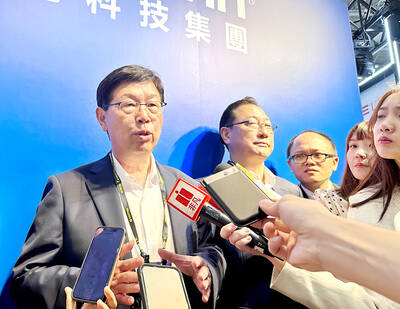AUTO PARTS
Tong Yang profit up 34%
Automotive metal sheet and bumper manufacturer Tong Yang Industry Co (東陽實業) yesterday posted a pretax profit of NT$153 million (US$5.06 million) for last month, up 34 percent year-on-year, thanks to rising aftermarket sales and more working days than February last year. Combined pretax profit in the first two months of the year was NT$297 million, or earnings per share of NT$0.53, the company said in an e-mail. Despite uncertainty caused by the COVID-19 pandemic, Tong Yang said it plans to focus on niche goods, such as water-based coating and electroplating products, while strengthening its competitiveness in lightweight technology and product research to ensure adequate supplies of parts to automakers in Taiwan and China, the e-mail said.
STEELMAKERS
Buyback fails to halt slide
Shares of Yieh Phui Enterprise Co Ltd (燁輝企業), the nation’s largest manufacturer of galvanized steel, yesterday closed 2 percent lower, despite the company announcing a share buyback program to safeguard the interests of its shareholders. The shares closed at NT$8.35 on the Taiwan Stock Exchange. The company said its board of directors had approved a plan to repurchase 100 million shares, or 5.23 percent of its issued shares, on the open market. Yieh Phui planned to buy back the shares at NT$8 to NT$9.50 from yesterday through May 15, the company said in a filing with the exchange. Due to falling steel prices, the company’s consolidated revenue fell 18.94 percent year-on-year to NT$59.68 billion last year, while uncertainty caused by the COVID-19 pandemic caused revenue to fall by 23.13 percent to NT$7.37 billion in the first two months of this year.
ELECTRONICS
JMC eyes capital reduction
JMC Electronics Co (易華電子), which specializes in chip-on-film technology for LCD driver ICs, yesterday said that its board of directors had approved a plan to reduce its capital by NT$170 million, or 17 percent, to increase shareholder returns and adjust its capital structure. After the capital reduction, which is pending approval by shareholders and regulators, JMC’s paid-in capital would fall to NT$830 million, the company said in a Taiwan Stock Exchange filing. The company plans to return NT$1.7 per share to shareholders following the capital reduction, in addition to a proposed cash dividend of NT$2 per share. JMC shares yesterday closed 9.67 percent lower at NT$49.05 in Taipei trading. The shares have fallen 39.22 percent so far this year.
TECHNOLOGY
Broadcom update positive
Broadcom Inc last week scrapped its full-year financial forecast because of the COVID-19 pandemic, but the US chipmaker’s comments about steady enterprise spending on data centers and 5G infrastructure should be positive for local technology companies, Yuanta Securities Investment Consulting Co (元大投顧) said in a client note. Steady demand for data center equipment should benefit Taiwan Semiconductor Manufacturing Co (TSMC, 台積電), Parade Technologies Ltd (譜瑞科技), Aspeed Technology Inc (信驊科技) and Quanta Computer Inc (廣達電腦), Yuanta said. Increased spending on 5G infrastructure would be positive for TSMC, King Yuan Electronics Co (京元電子), LandMark Optoelectronics Corp (聯亞光電) and Elite Advanced Laser Corp (聯鈞光電), it said. However, the coronavirus pandemic would continue to weigh on firms providing smartphone components to Broadcom, such as Win Semiconductors Corp (穩懋半導體), it added.

Taiwan Transport and Storage Corp (TTS, 台灣通運倉儲) yesterday unveiled its first electric tractor unit — manufactured by Volvo Trucks — in a ceremony in Taipei, and said the unit would soon be used to transport cement produced by Taiwan Cement Corp (TCC, 台灣水泥). Both TTS and TCC belong to TCC International Holdings Ltd (台泥國際集團). With the electric tractor unit, the Taipei-based cement firm would become the first in Taiwan to use electric vehicles to transport construction materials. TTS chairman Koo Kung-yi (辜公怡), Volvo Trucks vice president of sales and marketing Johan Selven, TCC president Roman Cheng (程耀輝) and Taikoo Motors Group

Among the rows of vibrators, rubber torsos and leather harnesses at a Chinese sex toys exhibition in Shanghai this weekend, the beginnings of an artificial intelligence (AI)-driven shift in the industry quietly pulsed. China manufactures about 70 percent of the world’s sex toys, most of it the “hardware” on display at the fair — whether that be technicolor tentacled dildos or hyper-realistic personalized silicone dolls. Yet smart toys have been rising in popularity for some time. Many major European and US brands already offer tech-enhanced products that can enable long-distance love, monitor well-being and even bring people one step closer to

RECORD-BREAKING: TSMC’s net profit last quarter beat market expectations by expanding 8.9% and it was the best first-quarter profit in the chipmaker’s history Taiwan Semiconductor Manufacturing Co (TSMC, 台積電), which counts Nvidia Corp as a key customer, yesterday said that artificial intelligence (AI) server chip revenue is set to more than double this year from last year amid rising demand. The chipmaker expects the growth momentum to continue in the next five years with an annual compound growth rate of 50 percent, TSMC chief executive officer C.C. Wei (魏哲家) told investors yesterday. By 2028, AI chips’ contribution to revenue would climb to about 20 percent from a percentage in the low teens, Wei said. “Almost all the AI innovators are working with TSMC to address the

FUTURE PLANS: Although the electric vehicle market is getting more competitive, Hon Hai would stick to its goal of seizing a 5 percent share globally, Young Liu said Hon Hai Precision Industry Co (鴻海精密), a major iPhone assembler and supplier of artificial intelligence (AI) servers powered by Nvidia Corp’s chips, yesterday said it has introduced a rotating chief executive structure as part of the company’s efforts to cultivate future leaders and to enhance corporate governance. The 50-year-old contract electronics maker reported sizable revenue of NT$6.16 trillion (US$189.67 billion) last year. Hon Hai, also known as Foxconn Technology Group (富士康科技集團), has been under the control of one man almost since its inception. A rotating CEO system is a rarity among Taiwanese businesses. Hon Hai has given leaders of the company’s six